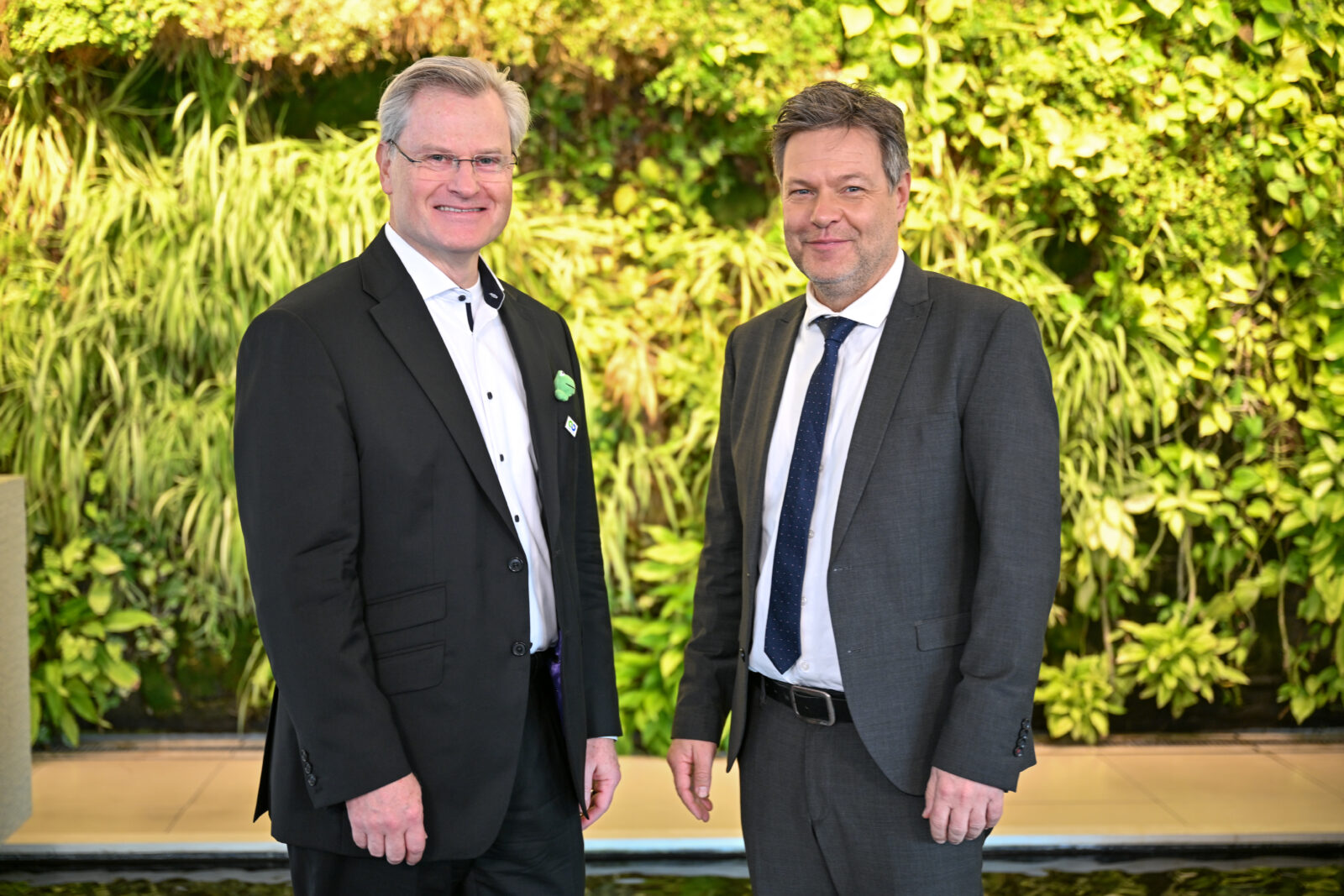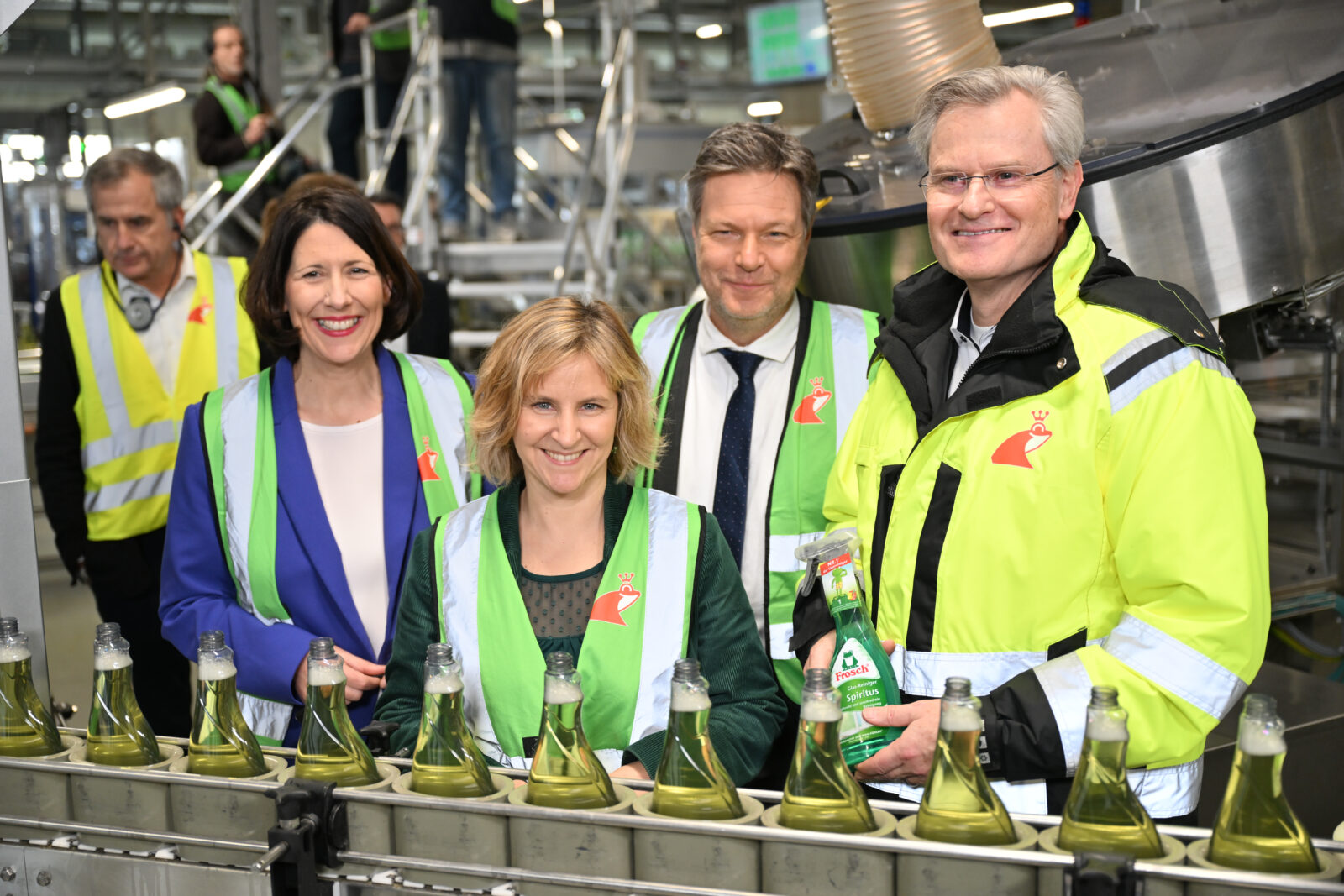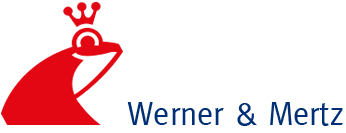Vice Chancellor Robert Habeck and Rhineland-Palatinate politicians make joint visit to Werner & Mertz
Mainz cleaning product manufacturer recognized as role model for environmentally friendly recycling of plastic
Robert Habeck, Vice Chancellor and Federal Minister for Economic Affairs and Climate Action, today visited Werner & Mertz headquarters in Mainz. He was accommpanied by his Rhineland-Palatinate colleagues, State Minister for Climate Protection Katrin Eder and State Minister for Economics Daniela Schmitt.
The visitors spoke with Reinhard Schneider, owner of the company for ecological detergents, cleaning agents and personal care products, about high quality mechanical recycling of used plastic from the Yellow Bag as a milestone in environmental and climate protection in Germany.

Federal Minister Habeck said, “Recycling and the circular economy are critically important for the successful decarbonization of our economy. The efficient and CO2-avoiding reuse of raw materials reduces resource consumption and thus a company’s ecological footprint. We need innovative technologies and action-backed commitment to climate and environmental protection and resource conservation on all fronts.”
Minister Eder praised Werner & Mertz as a role model, saying: “Climate protection always requires economical use of resources. We need a functioning circular economy. The type of material and its composition determine whether packaging is recyclable and if it can be kept within the circular economy. A recycling friendly design is critical. With its recycling initiative, Werner & Mertz has already made a significant contribution.”
The circular economy works – Werner & Mertz has proven that millions of times
Since 2012 Werner & Mertz and its Recyclate Initiative partners have been committed to reprocessing used plastic from household waste collections like the Yellow Bag for high quality reuse and to keeping it in a closed cycle. Proof of their success is in the more than 800 million bottles made of 100% post-consumer recyclate, produced and filled in Mainz for the well-known, trusted brand Frosch and other products. From 75 to 100 percent of the raw material for the plastic bottles comes from the Yellow Bag and the rest from European deposit bottles, which can not be filled again, given the normal wear and tear.
Day after day, the Mainz eco pioneer shows that upcycling of used plastic works. The recycled plastic can even be used in packaging for personal care products, such as shower gels, which are subject to strict requirements. Thanks to the use of the Yellow Bag for mechanical recycling, this material collection is finally what consumers have long awaited, i.e., the starting point of a truly closed loop. Now a bottle for dishwashing liquid can be made again into a bottle for dishwashing liquid.

Effective climate protection vs. greenwashing
Mechanical recycling is particularly resource-conserving. The reuse of plastic reduces the CO2 environmental load arising from the manufacturing of new plastic by about 60 percent. Furthermore, mechanical recycling is by far more environmentally friendly than the alternative, that is, CO2-emitting incineration still widely used. The worldwide CO2 emissions from plastic production and incineration are about as high as emissions from global air traffic. Flight-related emissions can be cut by not flying. In contrast, plastic can still be used and emissions avoided when energy-saving recycling succeeds.
Mainz eco pioneer is for quick implementation of the plastic tax
To date, Werner & Mertz is one of very few companies that counts on high quality mechanical recycling, especially with the Yellow Bag as the source of material. For financial reasons, most manufacturers hold onto the significantly less expensive virgin plastic. Therefore, the Mainz cleaning product manufacturer welcomes and supports the planned introduction of what’s called the “plastic tax“, which is a levy to be paid in the future by distributors of packaging made from virgin plastic. In Germany the EU-decreed levy has been settled with general tax revenue—and thereby paid by the end consumer and not the originator. Unlike in many other large European countries, the money collected here is not earmarked for environmental relief.
“When the plastic tax makes the use of virgin plastic more expensive for the manufacturer, there will be an effective incentive to invest in recyclate and mechanical recycling. That will strengthen the circular economy and provide real climate relief,“ said Schneider.
Habeck makes third visit to Werner & Mertz
Habeck has been the guest of the Mainz cleaning products company with the frog many times. In January 2019 the politician, then the party chairman of the Bündnis 90/Die Grünen, spoke with Schneider about the recently enacted packaging act. While on site, he had a close look at the achievements of the manufacturer of sustainable detergents and cleaning agents. At the dedication of the new production center in May 2019, he gave the keynote address.



